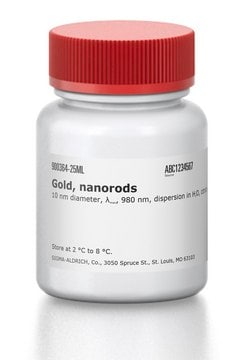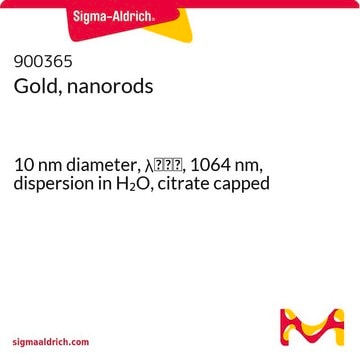900362
Gold, nanorods
10 nm diameter, λmax, 780 nm, dispersion in H2O, citrate capped
Synonym(s):
Au Nanorods
Sign Into View Organizational & Contract Pricing
All Photos(1)
About This Item
UNSPSC Code:
12141717
NACRES:
NA.23
Recommended Products
Quality Level
form
dispersion
dispersion in H2O
nanorod
concentration
35 μg/mL in H2O
L
38-42 nm
diameter
10 nm
pH
7
λmax
780 nm
storage temp.
2-8°C
Looking for similar products? Visit Product Comparison Guide
Related Categories
General description
- Longitudinal peak: 780 nm ± 15 nm
- Longitudinal absorbance: OD = 1
- Transverse Peak: 511 nm ± 5 nm
- Transverse absorbance: OD = 0.15
- Citrate capped
application
Owing to the excellent optical properties arising from the surface plasmon resonance, the gold nanorods find applications in biomedical imaging, drug delivery and photothermal treatment. The citrate capped nanorods are non-cytotoxic compared to the CTAB capped nanorods and are well suited for the biomedical applications.
Caution
Do not freeze.
Legal Information
This product was produced under the methods claimed in U.S. Pat. Nos. 8,956,440 and 8,241,922
Storage Class
12 - Non Combustible Liquids
wgk_germany
nwg
flash_point_f
Not applicable
flash_point_c
Not applicable
Certificates of Analysis (COA)
Search for Certificates of Analysis (COA) by entering the products Lot/Batch Number. Lot and Batch Numbers can be found on a product’s label following the words ‘Lot’ or ‘Batch’.
Already Own This Product?
Find documentation for the products that you have recently purchased in the Document Library.
Customers Also Viewed
Mohan Singh et al.
Journal of biomedical nanotechnology, 12(3), 481-490 (2016-06-10)
Gold nanoparticles are chemically fabricated and tuned to strongly absorb near infrared (NIR) light, enabling deep optical penetration and therapy within human tissues, where sufficient heating induces tumour necrosis. In our studies we aim to establish the optimal gold nanorod
Prit Manish Lakhani et al.
Nanotechnology, 26(43), 432001-432001 (2015-10-09)
Photothermal therapy, also referred to as optical hyperthermia or photothermal ablation, is an emerging strategy for treating solid tumours. Colloidal gold converts the absorbed light into localized heat via a non-radiative mechanism, surface plasmon resonance, which ablates the solid tumours.
Our team of scientists has experience in all areas of research including Life Science, Material Science, Chemical Synthesis, Chromatography, Analytical and many others.
Contact Technical Service


